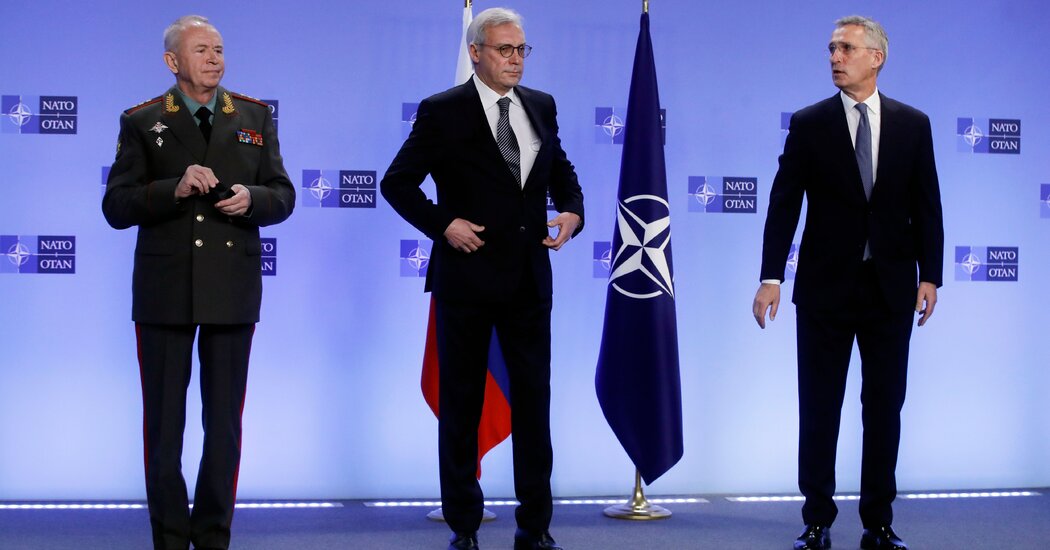
BRUSSELS — The leader of NATO said on Wednesday that “significant differences” remained between the bloc and Russia after four hours of talks aimed at holding off a further Russian invasion of Ukraine and calming tensions between Moscow and the West.
“Our differences will not be easy to bridge,” the NATO secretary-general, Jens Stoltenberg, told a news conference after the talks at the bloc’s headquarters in Brussels.
Mr. Stoltenberg said that NATO allies urged Russia to “immediately de-escalate the situation in Ukraine,” where close to 100,000 Russian troops have massed near the borders, and to respect the sovereignty and territorial integrity of its neighbors. Russian representatives did not commit to pulling back the troops, nor did they reject the demand, officials said.
NATO allies reaffirmed their refusal to accept Russian demands to stop further enlargement with countries that wished to join the alliance and to withdraw all allied troops from NATO members bordering Russia. Wendy R. Sherman, the deputy secretary of state who led the U.S. delegation to the talks, called some of Russia’s demands “simply non-starters.”
“This wasn’t an easy discussion, but that is exactly why this meeting was so important,” Mr. Stoltenberg said, adding that NATO allies and Russia had “a very serious and direct exchange on the situation in and around Ukraine, and implications for European security.”
The meeting at NATO’s Brussels headquarters was the second stop in a diplomatic roadshow focused on the Kremlin, after talks in Geneva on Monday between Russian and American officials. Looming over the high-level diplomacy is whether the Russian president, Vladimir V. Putin, will invade Ukraine as he seeks to pressure the West to roll back NATO’s presence in Eastern Europe, or de-escalate.
The United States and its NATO allies hope that Mr. Putin will decide to negotiate, as he is now confronted with threats of punishing economic sanctions and even of new deployments in NATO allies bordering Russia.
Mr. Stoltenberg said that NATO allies offered Russia a series of further meetings on wider issues of European security, including arms control and missile deployments. But while the Russian delegation was generally positive, he said, they would or could not commit to a new meeting. That is another indication that even Russia’s top diplomats may not know what Mr. Putin’s intentions really are.
Briefing reporters in Brussels, Ms. Sherman said that NATO officials laid out for the Russians areas “where we can work together and make real progress,” including on arms control and greater transparency in military exercises. She said the United States was prepared to talk further with the Russians, but seemed unsure whether Moscow would follow through.
“If Russia walks away,” she said, it would be “quite apparent that they were never serious about pursuing diplomacy at all.”
The Russian delegation was headed by a deputy foreign minister, Aleksandr V. Grushko, who was Russia’s permanent representative to NATO from 2012 to 2018.
It was formally a meeting of the NATO-Russia Council, which was established in 2002 to discuss mutual security concerns but has been essentially moribund since April 2014 and the Russian invasion of Ukraine and annexation of Crimea.
NATO has 30 members and so, in a sense, the meeting was 30 against one. Ukraine is not a member of NATO, though the alliance promised in 2008 that it would be someday.
NATO officials emphasized that they wanted to keep the focus on Russia’s large and continuing military buildup surrounding Ukraine, rather than on Russian desires to force a renegotiation of the post-Cold War security architecture in Europe.
After Monday’s talks, Sergei A. Ryabkov, who led the Russian side, denied that Russia had any intention of a new military invasion of Ukraine. At the same time, Mr. Ryabkov warned that if the West did not agree to Russia’s demands to pull back NATO’s footprint in Eastern Europe and reject any future membership for Ukraine, it would face unspecified consequences that would put the “security of the whole European continent” at risk.
Before Wednesday’s meeting, Mr. Grushko told reporters that “the moment of truth in our relationship with the alliance is arriving,” according to Russian news agencies.





